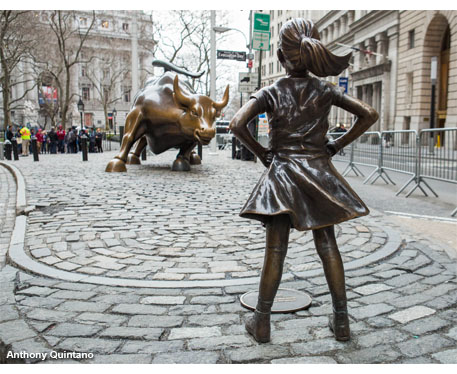Remember last year's viral outrage over a video of a doctor getting forcibly removed from a United Airlines flight when he refused to leave the plane after getting bumped because his flight was oversold?
That's so 2017.
Late last week Reuters broke the news that the Trump administration was opposing a provision in a Senate bill reauthorizing the Federal Aviation Administration funding that would upgrade consumer rights when it comes to airline flights, and ban bumping after passengers are checked in or seated on the plane. The idea behind the bill was that it's wrong to seat a customer only to tell them at the last minute they aren't going to their destination at that time because the airline sold tickets to more people than the plane could hold.
At the same time, the Trump administration also opposes a change that would permit government review of airline fees on everything from baggage to cancellations and ticket changes to see if the fees are "disproportionate to the costs incurred by the air carrier." That provision might make it harder for airlines to hit their customers with, say, ticket-change fees that equal or exceed the actual cost of the fare.
This is just the latest evidence that the Trump administration is enabling a turbo-charged predatory economy. Despite the fact that Donald Trump campaigned on a promise to drain the swamp, Trump appointees are distinguishing themselves by prioritizing big business over our personal finances at almost every opportunity:
- Over at the Consumer Financial Protection Bureau, temporary head Mick Mulvaney, who famously described the agency he now heads as a "sick, sad" joke, has presided over a neutering of the agency, closing down investigations of payday loan lenders, and supporting legislation signed by Trump that overturned regulations meant to protect African Americans and Latinos from paying higher rates for auto loans than white consumers.
- At the Education Department, Betsy DeVos has downsized a unit investigating fraud at for-profit colleges. As for an attempt to cut back on loan forgiveness to students who attended for-profit Corinthian Colleges, which closed down amidst a flood of controversy over lies about graduation and job-placement rates, a California court stepped in Friday night and stopped the department from doing it – at least for now.
According to Devin Fergus, the author of the soon-to-be-published book "Land of the Fee: Hidden Costs and the Decline of the American Middle Class," these sorts of fees ultimately exacerbate inequality. He calculated that charges related to subprime mortgages, payday and student loans and auto insurance premiums — money disproportionately paid by lower-income communities, and by Africans Americans and Latinos — alone cost Americans almost $1.5 trillion annually. That money flows upward to the large corporations extracting the sums and away from most of us.
As for the airline fees, they add up, too. According to regulators, U.S. airlines earned $7.5 billion in revenue from baggage and reservation-change fees in 2017, an increase of more than 30 percent from 2010. As Sen. Bill Nelson (Fla.), the ranking Democrat on the Senate Transportation Committee, told Reuters, the Transportation Department's opinion on the Senate attempt to crack down on airline fees and other predatory practices "reads more like something written by the airlines instead of the government watchdog that's supposed to be protecting consumers."
This hands-off approach by government, in turn, seems to tell businesses that petty — and not so petty — pocket-picking is A-okay. Heath insurers such as Anthem claim the right to decide your medical emergency was such an immediate need that they need to pay it – after you've received the service, which is likely to cost thousands of dollars. Financial institutions like Bank of America decide to pay their Merrill Lynch brokers not just based on selling investments but also on how successful they are at cross-selling the bank's credit cards, mortgages and checking and savings accounts to their customers — seemingly without taking into account whether those services are needed. Go to seek advice on your retirement accounts, stay for the pitch for bank products!
Then there is the bait-and-switch tax reform, which the Trump administration and Republicans said would result in pay raises and job gains. As it turns out, American corporations missed the memo. Last week, Axios revealed at a conference sponsored by the Dallas Federal Reserve, high-ranking c-suite executives said they would do no such thing. Instead, the money is going to share buybacks and stock dividends. In other words, the rich are likely to get richer, not just from the disproportionately large tax cut they received but because the tax cut is also enriching the companies they are invested in, giving both their income and wealth a boost — and this was sold as a boon to middle-class Americans, even as it will fleece them, via deficits and tax hikes later over time.
The economy of the Trump era is leaning into degrading both the quality of American life and our pocketbooks. It's not just that the Trump administration misleads about the impact of its policies (such as those discussed above) on the bottom line of most voters. It's not just that the federal government is doing away with regulations and laws that benefit ordinary Americans. It's that the government is saying this sort of behavior is more than permissible — it is what we should expect. If you get ripped off, it's on you.
In Trump's United States, business prospers, not just by innovating but also by taking advantage of customers. Trump and senior members of his administration are more than fine with that. They think that's how it should be.
eHarpers Ferry, WV





